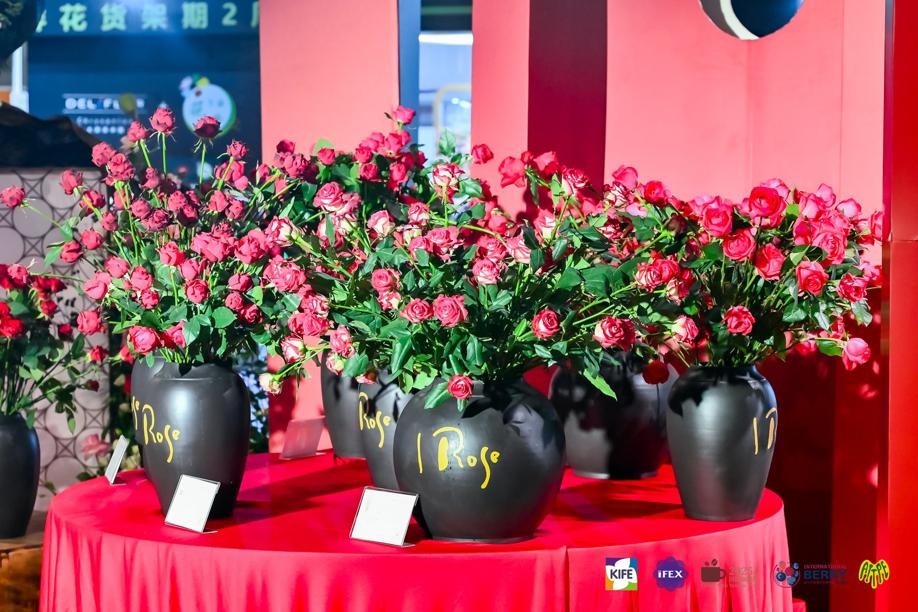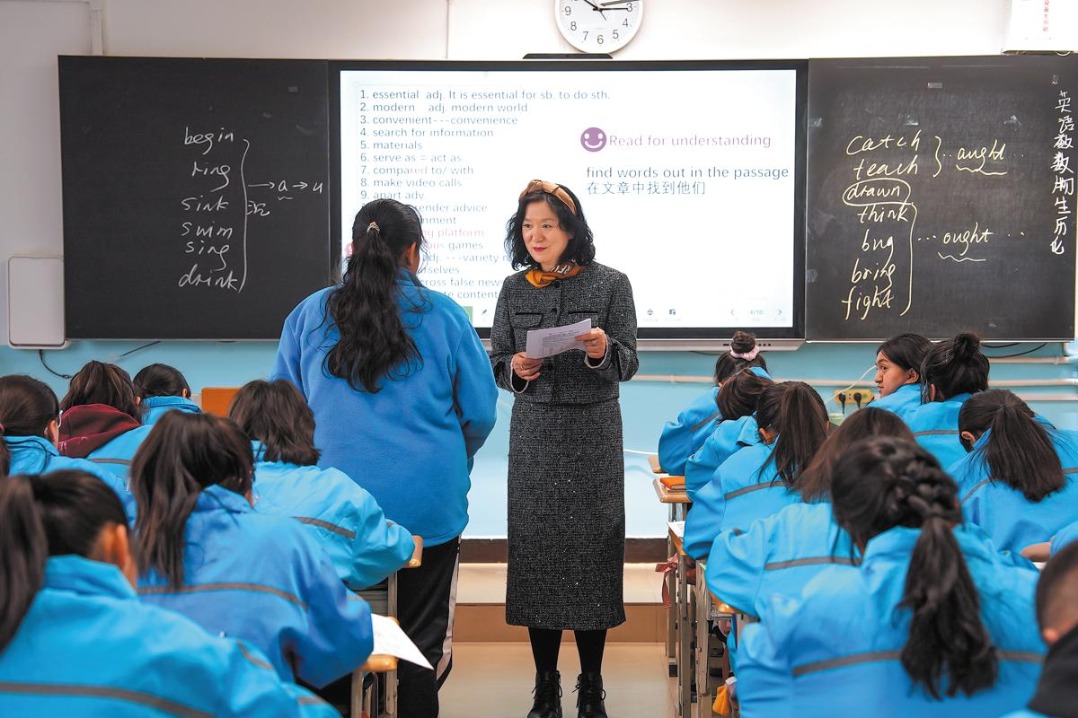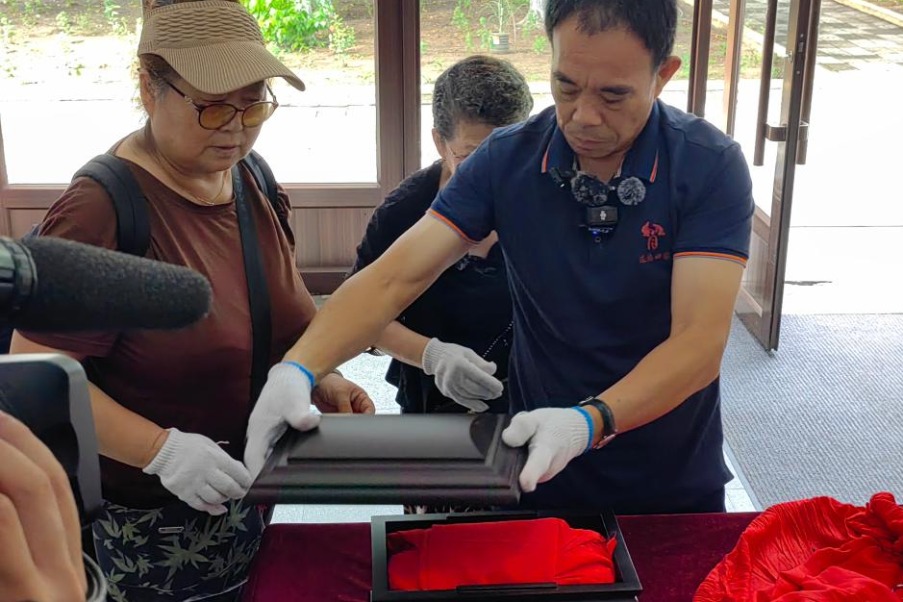A role model for students, colleagues alike
Veteran teacher excels in exchange position in remote Kashgar county


A charismatic exchange teacher in a remote county of Kashgar prefecture, Xinjiang Uygur autonomous region, has demonstrated how an individual with knowledge, confidence, passion, humor and sincerity can profoundly influence those around her. Within a year, her energetic, positive magnetism has inspired a strong will to progress among her colleagues and students, and she's striving to do even more as her time there counts down.
Since August 2024, Shen Ming, a veteran English teacher from Guangzhou Yucai Middle School in Guangdong province, has been teaching at No 2 Middle School of Shufu County in Kashgar.
Her participation is part of an educational talent support program for Xinjiang, initiated by the central government, which selects outstanding teachers from 19 provinces and municipalities each year to offer educational aid to Xinjiang.
According to Xu Gaoyong, deputy director of the regional education department of Xinjiang, strengthening the teaching workforce is the most fundamental aspect of advancing the educational cause in the region. Since 2012, around 22,100 teachers have joined the program, usually teaching for one-and-a-half years each, contributing to the overall improvement of Xinjiang's education quality.
Unlike her students in urban Guangzhou, who scored around 120 out of 150 on average in the national college entrance examination, or gaokao, Shen's students in Shufu have a relatively weak foundation in vocabulary, grammar and reading skills. In a single exam there could be as much as a 100-point disparity between the top student and the bottom-ranking student within a class.
Shen's efforts over the past year have yielded remarkable progress. Last semester's final exam saw one of her students move from the bottom of the class, ranking 58th, to the top 20.
Her class typically serves as the perfect stage to fully showcase her charm. Her student Gulinigar Abdurahman said that one of Shen's impressive strengths is her ability to keep students from getting distracted.
In June, Gulinigar Abdurahman received a provincial-level prize during the fifth edition of the Stories of China Retold in English Challenge, an international youth exchange event, along with 13 other students from the school. Shen coached her in oral English, speech skills and how to better express genuine emotions during speech. "It made me a more confident and courageous girl," she said.
Local teacher Abiba Akram, who has attended Shen's class daily, said her lessons are fast-paced and rich in information. If the mind wanders even briefly, one can lose the thread.
Shen deconstructs complex knowledge into understandable parts and has developed various tips, pithy formulas and mind maps to help students understand, memorize and apply the material flexibly, ensuring that even grammar lessons are engaging rather than dull.
Her lessons are unpredictable, filled with random questions that keep students focused. When students struggle to answer, she encourages them by saying, "Come on! Repeat after me!" If some of them still don't grasp it after multiple explanations, she reassures them not to worry and advises them to review the lessons later. In the next class she makes it a point to follow up with that specific student again.
Spotting a student dozing off in class, she will immediately offer snacks to wake them up. If someone pretends to know an answer, she jokes, "You should become a teacher yourself when you grow up, because you have the ability to speak about things you don't understand with confidence!"
Abiba Akram noted that some underprivileged students, who once lagged behind due to a lack of quality English education in junior high school, had become interested in English and active in class.
She was astonished to find that some of the naughty students she used to struggle with were well-behaved in Shen's class. One of these students had become a fan of Shen. When Shen asked the class to guess her age, this boy yelled, "42!" The 53-year-old teacher walked straight toward him and said, "I'm so glad you made me seem so young. I need to hug you!"
Abiba Akram said that Shen is particularly good at boosting students' self-esteem and spares no opportunities to praise them whenever she discovers even a small glimmer of potential.
Shen mentioned an introverted boy who used to score less than 20 in English exams. She worked to understand the reasons behind his feeling of inferiority and resistance. Upon discovering his strengths lay in chemistry and information technology, she brought him reference books on chemistry competitions from Guangzhou and sought his assistance with multimedia facilities before class, as a gesture to acknowledge her recognition of him.
She paid attention to encouraging and rewarding any progress he made, until one day the boy offered to recite vocabulary to her every day.
Abiba Akram used to be a junior high school English teacher, and because of her outstanding performance was transferred to the No 2 middle school to address the shortage of senior high school teachers.
With more than 30 years of teaching experience, Shen helped Abiba Akram navigate her initial confusion in conveying knowledge to students. She welcomed Abiba Akram to listen to her lessons, adopt her effective practices and ask questions.
Shen also tutored Abiba Akram on how to prepare for demonstration lessons and teaching competitions, fostering an inclusive environment for her to adjust to senior high school teaching.
Nowadays, Abiba Akram's class has matched Shen's in terms of school performance.
Observing how Shen interacts with students with care and approval — listening as some students share their untold, innermost thoughts and problems — how she encourages colleagues and students, motivating instead of complaining, and how she makes full use of fragmented moments of respite by reading, Abiba Akram said she's deeply touched and wonders if her former students could have achieved more with an education in Shen's style.
To help improve education quality in Shufu and guarantee the sustainability of new methods after exchange teachers leave, Shen emphasizes leveraging artificial intelligence in rural education and promoting educational equity. She stresses the need to enhance digital literacy among teachers and students to effectively use AI tools.
Abiba Akram said she's grown accustomed to AI assistance in designing questionnaires to assess students' knowledge base, generating visual content and creating interactive mini-games for practice in class.
Shen is currently leading a workshop with 15 teachers to explore innovative digital teaching methods while incorporating local characteristics.
They have developed dozens of demonstration lessons in subjects such as Chinese language and literature, English, history, chemistry and biology.
These lessons are shared across schools in Xinjiang — and also back in Guangdong — for mutual inspiration, with some winning national awards.
These achievements result from the dedicated efforts of local and exchange teachers. Abiba Akram observes that each time Shen returns from Guangzhou, well-rested and refreshed, she quickly dons beautiful clothes for photographs on the first day before long work hours diminish her vibrancy.
In Shen's perspective, lessons empowered by AI-generated content can deepen students' understanding, facilitate individualized teaching and learning, stimulate students' initiative and creativity, and spark interest.
To prevent students from becoming overly dependent on AI, Shen requires them to submit records of their AI interactions along with reflections on the interactions to showcase their thinking process, while strengthening classroom interactions and presentations to avoid ghostwriting and demonstrate their understanding.
"The AI 'fish' is so big and tempting that I cannot take it away. My responsibility is to teach my students how to harness it in the most efficient and intelligent way, while also being aware of the existence of 'fish bones'," she said.
Shen's tenure in Xinjiang will conclude in January. In the remaining months, she will focus on replicating the digital workshops organized by local teachers and passing on her teaching experience to the younger generation at the Shufu school.
Contact the writers at fangaiqing@chinadaily.com.cn
- A role model for students, colleagues alike
- Why China walks on path of peaceful development?
- CPC Guidelines for Governing Xinjiang in the New Era: Practice and Achievements
- Xizang fireworks draw criticism, spur probe
- Dunhuang cultural expo seeks to revive the Silk Road spirit
- J-20 fighter can easily penetrate air-defense networks, designer says




































